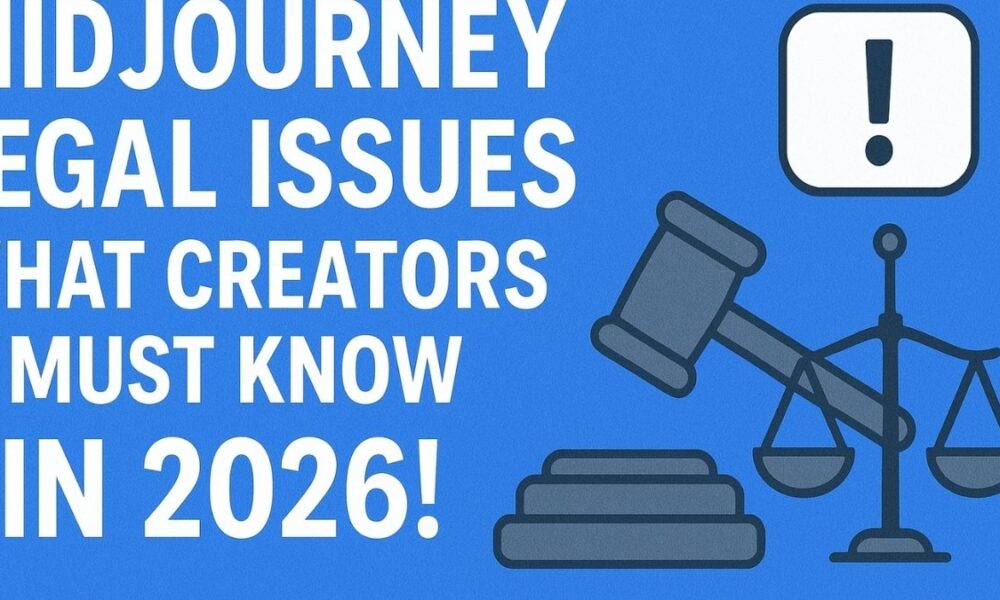Artifical intelligence
Midjourney Legal Issues: What Creators Must Know in 2026!

AI tools like Midjourney have changed the creative industry by enabling users to generate stunning visuals from simple text prompts. However, as the use of AI-generated art expands, questions around copyright, ownership, and intellectual property (IP) rights are gaining attention. Creators and businesses must understand the legal landscape before using Midjourney content commercially.
Legal Challenges Surrounding Midjourney
Copyright Ownership
AI-generated art is not always recognized as copyrightable under traditional laws. Since AI, not a human, produces the content, ownership can become legally uncertain.
Intellectual Property (IP) Risks
AI models are often trained on existing datasets. If generated visuals closely resemble copyrighted works, creators may face infringement claims.
Licensing Agreements
Midjourney’s terms of service determine how users can legally use generated content. Subscription levels may define whether the images can be used personally or commercially.
Ethical Considerations
Beyond legal issues, concerns remain about misuse of AI (e.g., deepfakes) and its impact on traditional artists.
Table: Legal Issues Creators Should Know
| Aspect | Details | Impact on Creators |
|---|---|---|
| Copyright Ownership | AI-generated works often not protected by traditional copyright laws. | Uncertainty about who owns the final output. |
| Intellectual Property | Generated visuals may resemble existing copyrighted works. | Risk of copyright infringement claims. |
| Licensing | Midjourney provides licenses depending on subscription tiers (personal vs commercial). | Must review terms before commercial use. |
| Ethical Concerns | Use of AI in art raises questions about originality and replacement of human artists. | Reputation and trust issues in professional settings. |
| Future Regulations | Governments are working on AI-specific copyright frameworks. | Laws may soon give clearer rules for AI-generated works. |
What Creators Should Do to Stay Protected
- Review Midjourney’s terms of service regularly.
- Blend AI outputs with original creativity for uniqueness.
- Stay updated on evolving AI copyright laws.
- Avoid prompts that replicate brands, celebrities, or copyrighted material.
- Seek legal guidance for large-scale commercial projects.
Future of AI and Copyright
Legal frameworks around AI-generated content are still evolving. Countries may soon introduce specific laws that define how copyright applies to AI-generated works, giving creators more clarity.
Key Legal Challenges for Creators
1. Copyright Ownership Uncertainty
Most countries do not yet recognize AI-generated content as having traditional copyright protection. This means creators may struggle to claim full ownership of Midjourney outputs.
2. Intellectual Property Risks
If an AI-generated image looks too similar to an existing copyrighted design, creators may face legal disputes. For instance, generating images inspired by popular movies, brands, or characters can lead to infringement.
3. Licensing Rules by Midjourney
Midjourney’s terms of service play a crucial role in determining what users can and cannot do:
- Free-tier users may not have full commercial rights.
- Paid subscribers typically gain broader licensing rights, but with certain restrictions.
4. Ethical and Moral Questions
Even when not illegal, ethical concerns exist:
- AI art may devalue original human artistry.
- It can be misused for deepfakes, misinformation, or misleading visuals.
5. Evolving Global Regulations
Governments and legal bodies are actively debating AI copyright laws. For example:
- The U.S. Copyright Office has rejected claims of copyright for AI-only artworks.
- The EU is drafting AI Act regulations that could impose stricter transparency requirements.